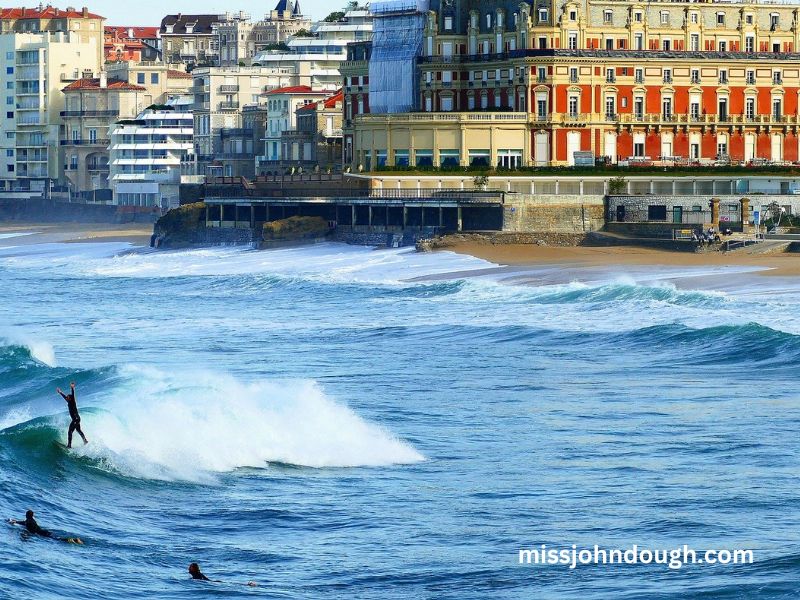Biarritz, a picturesque coastal town in southwestern France, is often cited as the “birthplace of European surfing.” This claim has long been debated among surfing enthusiasts, historians, and travelers alike. While surfing originated in ancient Polynesia, it was in Biarritz that surfing first gained prominence in Europe during the late 1950s. But is Biarritz truly the birthplace of surfing? In this article, we’ll delve into the history of surfing in Biarritz, explore the town’s role in the sport’s development, and answer the question: Is Biarritz the birth place of surfing?
The Origins of Surfing: A Global Perspective
Before Biarritz became associated with surfing, the roots of this sport can be traced back to ancient Polynesian culture. Surfing, or “he’e nalu” in Hawaiian, was an essential part of Hawaiian society. The sport was practiced by the Hawaiian people for centuries, with surfboards made from native woods and techniques passed down through generations. Surfing in Hawaii was not just a recreational activity; it was deeply ingrained in the culture, with spiritual and social significance.
In the early 20th century, surfing began to spread beyond Hawaii. Influenced by Hawaiian pioneers like Duke Kahanamoku, who traveled worldwide to promote the sport, surfing found its way to places like California and Australia. By the time surfing reached Europe, particularly in Biarritz, the sport had undergone significant changes, evolving into the modern version we recognize today.
Biarritz: The European Gateway to Surfing
Biarritz’s association with surfing began in the late 1950s when the sport first reached Europe. The town’s unique location on the Bay of Biscay, with its consistent waves and stunning beaches, made it an ideal destination for surfing enthusiasts. The arrival of surfing in Biarritz coincided with the post-World War II boom in tourism, as travelers sought new adventures and experiences.
The Early Days of Surfing in Biarritz
Biarritz was introduced to surfing largely through American soldiers stationed in France during World War II. Many of these soldiers were surfers from California, and they introduced the sport to the French coast after the war ended. However, it wasn’t until the late 1950s that Biarritz truly became a surfing hotspot.
In 1957, a group of American surfers and French enthusiasts set up the first surfing school in Biarritz. The establishment of this school marked a key turning point for the sport, as it began to attract more and more surf lovers from all over Europe. As the first European surf school, it provided the necessary foundation for the growth of surfing culture in the region and laid the groundwork for Biarritz’s reputation as a surfing mecca.
By the 1960s, the town had become a gathering place for surfers from across Europe and beyond. Surf culture blossomed in Biarritz, with surfers, artists, and musicians contributing to the vibrant atmosphere. Over time, the sport’s influence spread to other coastal towns in France and Spain, but Biarritz remained the center of the European surfing scene.
Biarritz’s Role in the Development of Surf Culture
Biarritz not only served as a destination for surfing enthusiasts but also became a symbol of the growing surf culture in Europe. In the 1960s and 1970s, Biarritz was home to the emergence of surf fashion, music, and lifestyle. The town’s surf scene was closely tied to the development of surfboards and other surf-related equipment. Many surfboard manufacturers set up shops in Biarritz, and surfers could be seen testing the latest models on the waves.
Additionally, the town played a major role in promoting the social aspects of surfing. Surfing was more than just a sport; it was a lifestyle. The carefree attitude, the connection to nature, and the sense of freedom that came with riding the waves all became an integral part of the surf culture that flourished in Biarritz during this time.
Biarritz also hosted some of Europe’s first professional surfing competitions, which further solidified its reputation as a hub for the sport. The Biarritz Surf Festival, established in the 1980s, became an annual event that attracted surfers from all over the world, showcasing Biarritz’s importance as a global surfing destination.
The Birth Place of Surfing in Europe: A Claim to Fame
While Biarritz may not be the birthplace of surfing in the world, it can certainly lay claim to being the “birthplace of surfing in Europe.” The town’s role in introducing and popularizing surfing on the continent is undeniable. Today, Biarritz remains one of the most important surfing destinations in Europe, and its legacy continues to influence the surfing culture worldwide.
The Influence of Biarritz on Modern Surfing
Biarritz’s influence on modern surfing goes beyond its historical significance. The town continues to attract surfers from all corners of the globe, with its world-class waves and thriving surf community. Over the years, Biarritz has hosted numerous international surf competitions, including the Quiksilver Pro France, which is part of the World Surf League’s Championship Tour.
The town has also become a hub for surf tourism, with many surfers visiting Biarritz for its perfect waves, stunning coastline, and vibrant surf culture. Surf schools, shops, and surfboard manufacturers are still present in the area, further contributing to Biarritz’s status as a surfing destination.
In addition to its strong surf culture, Biarritz has embraced surfing as part of its identity. The town’s beaches, such as Côte des Basques, are famous for their consistent waves, making them a popular spot for both beginners and experienced surfers. The surrounding Basque Country region offers a range of surf spots, from challenging reef breaks to more mellow beach breaks, providing something for every surfer.
The Future of Surfing in Biarritz
As surfing continues to evolve, Biarritz remains at the forefront of the sport’s development in Europe. The town’s surf scene has expanded in recent years, with new surf events, festivals, and innovations in surfboard design. Biarritz has also seen a rise in the popularity of alternative surf disciplines, such as longboarding, stand-up paddleboarding (SUP), and even wave pools.
Biarritz’s connection to surfing is stronger than ever, and the town is likely to remain a key player in the European surf scene for the foreseeable future. The town’s dedication to preserving its surf culture while embracing innovation ensures that it will continue to inspire and attract surfers from all walks of life.
Conclusion: Is Biarritz the Birth Place of Surfing?
While Biarritz may not be the birthplace of surfing itself, it undeniably holds the title of the “birthplace of European surfing.” The town played a crucial role in introducing the sport to the European continent, and its influence on surf culture continues to this day. Biarritz’s beautiful coastline, ideal surf conditions, and rich surf history have made it a beloved destination for surfers from around the world.


